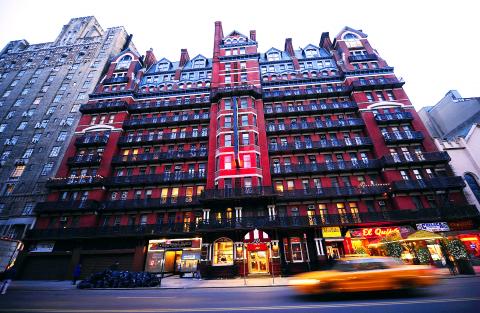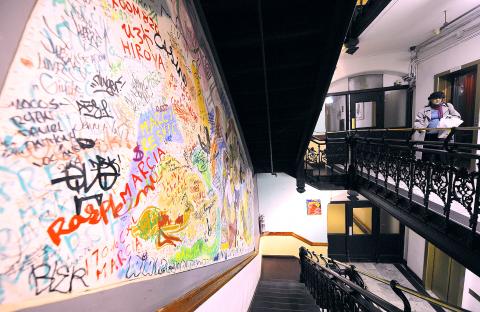New York’s storied Chelsea Hotel, the classic haunt of artists and hell-raising performers, is for sale and, perhaps, so is its soul.
The 12-floor building with the neon sign “Hotel Chelsea” is a landmark in Manhattan thanks to its long list of famous residents.
Playwright Arthur Miller and singers Janis Joplin and Patti Smith were among those living there. Poet Dylan Thomas died there, as did Nancy, the girlfriend of Sex Pistols bassist Sid Vicious. Andy Warhol made a film called Chelsea Girls, while Leonard Cohen immortalized the place in a song about his brief encounter there with Joplin, singing, “I remember you well in the Chelsea Hotel.”

Photo: AFP
In his classic song Sara, Bob Dylan sang about how he was, “Staying up for days in the Chelsea Hotel, writing Sad Eyed Lady of the Lowlands for you.”
The improbable list testifies to a hotel that was never meant to be just another hotel.
Built in 1883 on the west side, Chelsea Hotel was bought in the late 1930s by three Hungarian-Americans and a decade later, in the 1950s, entered its golden age as a symbol of New York bohemian life. Three years ago the descendants of those owners squeezed out shareholder Stanley Bard and began their plan to throw the building to the market — a shock in a place where permanent residents were paying peanuts for the privilege to live there.

Photo: AFP
The price tag is believed to be between US$90 million and US$100 million for the Big Apple icon. After four months there are still no takers.
But among possible buyers mentioned is Andre Balazs, who owns the trendy Standard Hotel chain and the luxury Chateau Marmont in Hollywood. There are rumors that developer extraordinaire Donald Trump has shown interest. Future owners may dream of cashing in on the Chelsea name, while transforming the quirky set-up into something more resembling a straightforward hotel.
Bard, now 76, hopes the rare formula of mixing low-rent, artistic residences with expensive hotel rooms will survive.
The Chelsea veteran remembers the 1950s, when he became manager at the age of 24 and New York was buzzing with new stars like Dylan, Cohen and Robert Mapplethorpe.
Those were wild times when booze and drugs flowed freely in the Chelsea. Now there are mostly just memories and mementos, not least the painting hanging in a corridor of Sid Vicious clutching a syringe.
“My objective was to give people the ‘Chelsea experience,’ to make people happy,” Bard told Agence France-Presse, as he showed room 712, a five-piece suite that once housed playwright Arthur Miller, his wife Inge Morath and their daughter Rebecca. A picture of Miller and Marilyn Monroe, his second wife, hangs on the wall.
Rent stabilization laws meant that many tenants paid just a few hundred US dollars in rent, compared with hotel rooms costing US$400 to US$500 just for a night. But part of the Chelsea lore is also the way Bard accepted art works in place of rent payments.
“I remember seeing [sculptor] Arman works in the entrance and then Stanley was very friendly with [painter] Larry Rivers,” said longtime resident Man-lai Liang, referring to artists whose works sell for small fortunes now. “Those pieces disappeared for restoration and never returned,” she added.
Rock star Patti Smith, another denizen of the Chelsea, writes in her autobiography Just Kids how the lobby dripped with “bad art.”
There are still 90 fulltime residents and they are protected by city rental laws from being evicted easily. “We are impossible to kick out,” said Nicola L, a French artist who has been occupying a big room there for 20 years — even if there isn’t always central heating.
So can this curious old relic — and its unique collection of inhabitants — be dragged into the modern hotel world? Scott Griffin, head of the Chelsea residents association, thinks not easily. “If they were wise, they would try to embrace the tenants and make it work,” he said of the future owners.
Griffin added: “What all these businessmen try to do is make it only into a hotel and when you do that, the building resists, because it is not physically designed to do that, in the same way that your bathroom is not designed to be a concert hall. Until the owner understands the long-term residents are a successful partner ... they will fail.”

June 9 to June 15 A photo of two men riding trendy high-wheel Penny-Farthing bicycles past a Qing Dynasty gate aptly captures the essence of Taipei in 1897 — a newly colonized city on the cusp of great change. The Japanese began making significant modifications to the cityscape in 1899, tearing down Qing-era structures, widening boulevards and installing Western-style infrastructure and buildings. The photographer, Minosuke Imamura, only spent a year in Taiwan as a cartographer for the governor-general’s office, but he left behind a treasure trove of 130 images showing life at the onset of Japanese rule, spanning July 1897 to

In an interview posted online by United Daily News (UDN) on May 26, current Chinese Nationalist Party (KMT) Chairman Eric Chu (朱立倫) was asked about Taichung Mayor Lu Shiow-yen (盧秀燕) replacing him as party chair. Though not yet officially running, by the customs of Taiwan politics, Lu has been signalling she is both running for party chair and to be the party’s 2028 presidential candidate. She told an international media outlet that she was considering a run. She also gave a speech in Keelung on national priorities and foreign affairs. For details, see the May 23 edition of this column,

The Taiwan People’s Party (TPP) on May 18 held a rally in Taichung to mark the anniversary of President William Lai’s (賴清德) inauguration on May 20. The title of the rally could be loosely translated to “May 18 recall fraudulent goods” (518退貨ㄌㄨㄚˋ!). Unlike in English, where the terms are the same, “recall” (退貨) in this context refers to product recalls due to damaged, defective or fraudulent merchandise, not the political recalls (罷免) currently dominating the headlines. I attended the rally to determine if the impression was correct that the TPP under party Chairman Huang Kuo-Chang (黃國昌) had little of a

At Computex 2025, Nvidia CEO Jensen Huang (黃仁勳) urged the government to subsidize AI. “All schools in Taiwan must integrate AI into their curricula,” he declared. A few months earlier, he said, “If I were a student today, I’d immediately start using tools like ChatGPT, Gemini Pro and Grok to learn, write and accelerate my thinking.” Huang sees the AI-bullet train leaving the station. And as one of its drivers, he’s worried about youth not getting on board — bad for their careers, and bad for his workforce. As a semiconductor supply-chain powerhouse and AI hub wannabe, Taiwan is seeing